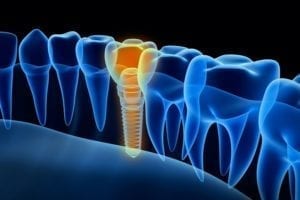Both dentures and dental implants are popular ways to replace missing teeth. But how do you know which one is the best option for you? Dr. Elise Brace of Kildaire Family and Cosmetic Dentistry explains the positives and negatives of both dentures and dental implants in Cary, NC.
Dentures: What to Know
Removable dentures are often thought of as a way to replace an entire arch of missing teeth. But partial dentures are always an option as well. They’re typically made of a metal and resin base that supports plastic or ceramic teeth. Some of the highlights of dentures include that they’re cheaper to get upfront, and you can get the restoration faster as it has no surgical element.
However, dentures do come with many drawbacks. While you don’t pay as much upfront, dentures can lead to more costs in the future. When you lose a tooth, the jawbone starts to deteriorate in that area. Since dentures don’t replace the tooth root, the jawbone continues to deteriorate. You’ll need to get the denture readjusted or replaced to ensure it stays functional.
Dentures only give you back 30-40% of your bite function and require adhesive to stay in the mouth. You have a risk of the restoration slipping or falling out while you’re eating or speaking. Certain foods may need to be avoided because the dentures can’t handle them. Because of the adhesive, you’ll have to remove the dentures every night and make sure they’re cleaned thoroughly.
The Benefits of Dental Implants
There’s a reason why dental implants are often considered the gold standard of tooth replacement. Implants are made up of three different parts. First, a titanium implant post is placed in the jawbone. Next, a piece called an abutment is attached to connect the post to the final restoration. The final restoration is usually a dental crown, but implants can also support a fixed bridge or denture.
Many people balk at the upfront cost of dental implants. But you don’t incur any surprise costs later with them. Implants are the only solution that replaces the tooth root as well as the crown. This stops the jawbone from deteriorating any further and can even help to reverse some of the deterioration that’s already occurred.
Dental implants do take longer for you to get the final restoration. This is due to the surgical element. After the implant posts are placed, it takes 3-6 months for them to heal and fuse with the jawbone before we can move forward. However, this is what gives implants the stability they’re known for. You should have no problems eating or speaking, and you’ll get back 100% of your bite function.
Even with advancements in dentistry, dentures can still be bulky and hard to get used to. They don’t feel natural. Implants, particularly with a dental crown as the final restoration, both look and feel like your natural teeth. They don’t require extra maintenance, either. Just brush, floss, and visit the dentist regularly!
Getting Dental Implants in Cary, North Carolina
Do dental implants sound like the solution for you? Call us or schedule an appointment online.
